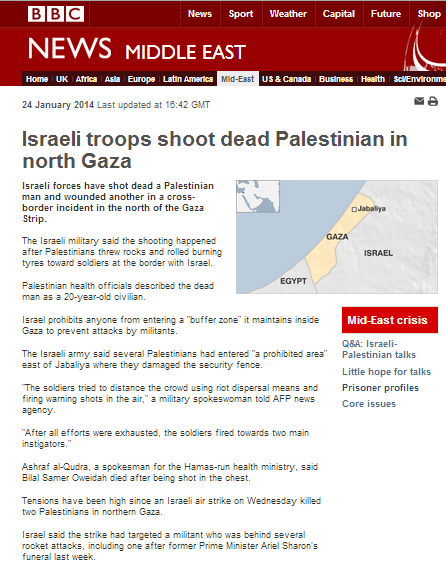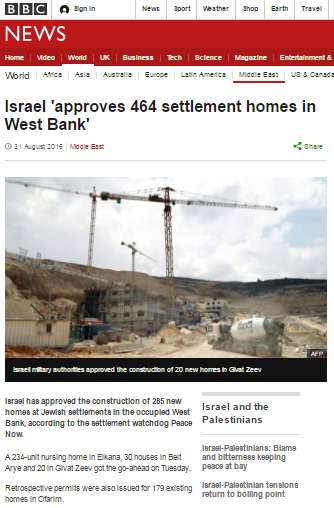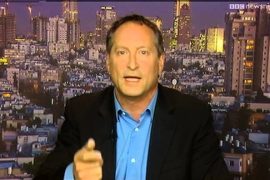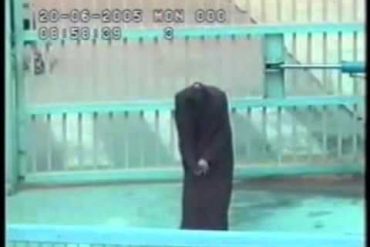A filmed report by Yolande Knell from July 15th which was promoted on the BBC News website under the title “‘Essentials, not luxuries’ being bought in Gaza” as well as being broadcast on BBC television news provides an interesting example of how the framing of a story can actively prevent audiences from properly understanding an issue.
Knell reports from a market in Gaza City.
“This is how most of the shops look all around Gaza City. They’re completely closed up because of the ongoing fighting. But the main market here is still open and this is the busiest time of the day, although business has really been down over the past week. Abu Ahab has had a stall here in the market for the past five years. He’s selling dates, which are really popular at this time during the Islamic holy month of Ramadan. Abu Ahab – how is business?”
Stallholder: “The situation this year is different because of the war. Those who come here shopping come only for the essentials – not for the luxuries. Instead of taking [a] kilo of dates they take half a kilo. Why? Because some people haven’t been paid, because of the blockade and there is a war at the same time. People have no money. The war is terrifying them. They are selling their possessions so they can buy food for Ramadan.”
Knell: “Already, the economic situation in Gaza is very tough because of the tight border restrictions imposed by Israel and Egypt. That means there’s very little industry and there’s high unemployment. Recently – to make matters worse – there’s been no money to pay the Hamas government employees and that dispute has led to banks being closed and a shortage of cash for everyone.”
As we see, audiences are encouraged to believe that the difficult economic situation in the Gaza Strip is primarily – if not exclusively – attributable not to the ineptitude of the Hamas government which ruled it for the last seven years and not to that organisation’s decision to divert resources into terrorism rather than building a sustainable economy and a healthy civil society, but to Israeli and Egyptian policies enacted in order to cope with that terrorism.
This, of course, is the topsy-turvy line which Knell has been pushing for some time now – as we have documented here in the past (see examples here, here and here). The phrase “tight border restrictions” is frequently used by Knell and other BBC employees without any adequate explanation of what that actually means.
In fact the only restrictions in place are those prohibiting the import of weapons (as, one imagines, is the case at most international borders) and dual-use goods which can be used for military purposes to the Gaza Strip. Even those dual-use goods can be imported into the Gaza Strip with special co-ordination and on condition that their use is supervised. All other goods can enter the Gaza Strip from Israel freely.
Notably, neither Knell nor any other BBC journalist has in the ten days since the conflict began seen fit to inform audiences that humanitarian aid has continued to be supplied to the Gaza Strip throughout the entire time.
But Knell’s final sentence is particularly interesting – especially because of what it does not tell viewers.
“Recently – to make matters worse – there’s been no money to pay the Hamas government employees and that dispute has led to banks being closed and a shortage of cash for everyone.”
Banks in the Gaza Strip were indeed closed for six days at the beginning of June but Knell neglects to inform audiences why and the BBC did not report on the topic at the time.
“Banks in the Gaza Strip reopened Wednesday, after being closed for six days following a cash-run on the banks by Palestinian civil servants demanding unpaid salaries, Palestinian media reported.
The payment crisis sparked a severe public dispute between Fatah and Hamas, just days after the establishment of the new technocratic unity government. Hamas claimed that the Palestinian Authority and Palestinian President Mahmoud Abbas should pay the salaries, while the PA rejected the demand. […]
Jihad al-Wazir, head of the Palestinian Monetary Authority, the Palestinians’ central bank, said “All automatic telling machines at bank branches in the Gaza Strip are working again today.”
Hamas forces withdrew from outside banks, where they had been preventing the use of ATMs. [….]
Hamas demanded Thursday that the Palestinian Authority take employees of the disbanded Gaza government onto its payroll, after the PA’s Gaza-based staff received their salaries but their Hamas counterparts went empty-handed.
After scuffles broke out at ATMs, Hamas security forces closed the banks.”
So in other words, the banks were closed because the Hamas private militia closed them because the Palestinian unity government to which it is party and which it agreed would rule the Gaza Strip instead of Hamas wouldn’t do what Hamas wanted.
Now doesn’t that sound rather different to the version of the story Yolande Knell is telling BBC audiences? But the really important part of Knell’s omissions in this report and others in relation to the current situation is that one of the conditions presented by Hamas for a ceasefire to end the current round of conflict is that the PA pay these people (some of whom are employees of Hamas’ Izz ad Din al Qassam Brigades) anyway. So far, the BBC has failed completely to inform BBC audiences of any of Hamas’ demands which are not related to Israel.
Another interesting point to note is that whilst the BBC took a distinctly ‘best thing since sliced bread’ approach to the Hamas-Fatah unity deal at the time, since the upsurge in hostilities it has been remarkably reticent about clarifying to BBC audiences the significance of the fact that officially, the Palestinian Authority is in charge of the Gaza Strip – from which well over a thousand missiles have been fired at Israeli civilians in just over a week – in clear breach of existing agreements between the PA and Israel.
“…Hamas has officially renounced its responsibility for governing Gaza, while the Palestinian unity government has already begun the process of taking over the administration of Gaza. Over a week ago (July 5/6), a senior Hamas official, Ahmad Yousef, was “asked about increased rocket fire on Israel in recent weeks” in an interview with Palestinian news agency Ma’an. His answer: “From a political point of view, (Prime Minister) Rami Hamdallah is responsible and he can give orders to security services to intervene. Hamas is not ruling the Gaza Strip and so it’s not responsible for protecting borders”.”
Now of course all that is a lot more of a headache to explain to BBC audiences than ‘(some) people in Gaza are poor because of Israeli and Egyptian border restrictions’, but if the BBC is to meet its obligation to “[b]uild a global understanding of international issues”, it is going to have to stop dumbing down its reporting and start providing them with the entire picture instead of inaccurate politically motivated sound-bites.
Related Articles:
BBC’s Knell inaccurately attributes shortage of medical supplies in Gaza to Israel




